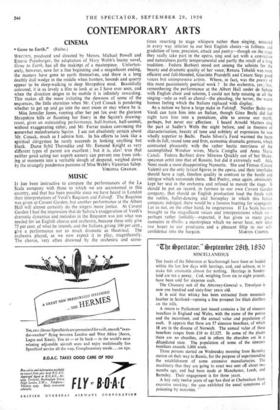MUSIC
IT has been instructive to compare the performances of the La Scala company with those to which we are accustomed in this country, and that has been possible since we have heard in London their interpretations of Verdi's Requiem and Falstaff. The Requiem was given at Covent Garden, but another performance at the Albert Hall will almost certainly do the singers more justice. At Covent Garden I had the impression that de Sabata's exaggeration of Verdi's dramatic dynamics and melodies in the Requiem was just what was needed for an English chorus and orchestra, because these only give 75 per cent. of what he intends, and the Italians, giving 100 per cent., give a performance not so much dramatic as theatrical. The orchestra played, as we now expect it to play, magnificently. The chorus, very often drowned by the orchestra and some- times resorting to stage whispers rather than singing, sounded in every way inferior to our best English choirs—in fullness and gradation of tone, precision, attack and-poetry—though on the stage they really take part in the opera, sing and act with a conviction and naturalness partly temperamental and partly the result of a long tradition. Fedora Barbieri stood out among the soloists for the beauty and dramatic quality of her voice,-Renata Tebaldi was most efficient and full-blooded, Giacinto Prandelli and Cesare Siepi good voices but unimpressive artists. Where, in fact was the poetry of this most passionately poetical work ? In the orchestra, yes ; but, remembering the performance at the Albert Hall under de Sabata with English choir and soloists, I could not help missing in all the singing—solo as well as choral—the pleading, the terror, the warm human feeling which the Italians replaced with display. As a nation we have a large stake in Falstaff. Neither Boito nor Verdi can turn him into an Italian, though Gino Bechi did last night turn him into a pantaloon, able to arouse our mirth, perhaps, but never our affection. I heard Arnold Matters sing the part at Sadler's Wells the night before, and in fineness of characterisation, beauty of tone and subtlety of expression he was wholly superior to Bechi. Paolo Silveri's Ford warmed the heart with its full, round tone and firm, economic dramatic gestures, which contrasted pleasantly with the rather hectic merriness of the accomplished Windsor wives, Maria Caniglia and Anna Maria Canali. Fedora Barbieri drew Mistress Quickly out of her Shake- spearean orbit into that of Rossini, but did it extremely well. Alda Noni made a most disappointing Nannetta. She and Fenton (Cesare Valetti) are the only lyrical figures in the opera, and their interludes should have a rapt, timeless quality in contrast to the bustle and intrigue which surrounds them. But Poetry, once again, obstinately kept her seat in the orchestra and refused to mount the stage. It should be put on record, in fairness to our own Covent Garden company, that should an English production load the finale with the rattles, ballet-dancing and horseplay in which this Italian company indulged, there would be a famous hunting for scapegoats. Let us not, on the other hand, be ungenerous. If La Scala has not brought us the magnificent voices and interpretations which we— perhaps rather foolishly—expected, it has given us many great moments in Otello, a masterpiece which we never hear, new ideas (we hope) to our producers and a pleasant fillip to our self-


























 Previous page
Previous page